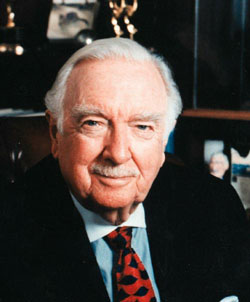Huddled before the big console television in our cookie cutter home in Virginia Beach, we watched the stolid news figures of the day as they read off from sheets of paper, looking up gravely into the camera every few lines. I started taking a more active interest in the news around 1972, during the Nixon-McGovern showdown. Vietnam was winding down, Watergate was heating up and the Arabs and Israelis were always squabbling.

Walter Cronkite
1972 was the year Walter Cronkite was thought by many to be the most trusted man in the country. I think Uncle Walter probably knew this was more of a comment on the sad state of affairs nationally than it was a complete vote of confidence for him. Folks that are a little younger than me don't remember how bad those days got to be. I have to laugh a little every time I get an urgent email forward telling us, couched in fund-raiser lingo, that America is in its darkest hour. Believe me, things have been a lot worse. A whole lot worse.
Even as an eleven year old, I knew the country was in serious trouble. The fabric of the presidency was unwinding before our very eyes. I watched the demise of Richard Nixon and I cried. We had lost a war for the first time in our proud history and soldiers returned without honor, railed upon by draft dodgers and peaceniks who had no idea what their uniformed brethren had lived through. Others never came back. The economy was in the toilet. The Cold War was in full swing and it was looking bad for the good guys.
Someone had to step into the vacuum of trust. Who would have thought it would be the journalists? Not even they expected it. But as the Washington Post brought down a corrupt president and the nation's Armed Forces returned in defeat, the sonorous tones of Walter Cronkite broke through the chaos, much as it had when John F. Kennedy was shot, We needed him. And unbeknownst to him, he presided over an irreversible transition in the life of American journalism.
He became a star. Years later he would note how, when he and his colleagues got into the TV news business, they were thought of as working class stiffs. Their salaries were at the level of school teachers and cops. They drove average cars, worked killer hours, had families, drank a lot of beer and smoked a lot of cigarettes. They were part of the fabric of the public they served.
But, like the lead character in "Legend," Cronkite was the last of a breed. When he retired he was replaced by the man who had become famous for slicing and dicing Richard Nixon on CBS--Dan Rather. And Dan Rather started the pernicious legacy of superstar news personalities commanding multi-million dollar salaries. And TV news, which Malcolm Muggeridge argued was never really news at all, became just another form of entertainment.
Cronkite himself leveled disparaging remarks against the shift. The job, he said, was essentially to read the news, not to report. The news anchor was a news reader and nothing more. Cronkite and those of his ilk--Morrow, Reasoner, Mudd and others like them--wouldn't be marketable today as anything but voice-over talent.
But there's no putting the toothpaste back into the tube. Flip through the dozen or more news channels at any given time of the day now and what do you see? Lots of strutting male peacocks and sharp-tongued bottle blondes, not to mention a heavy contingent of former beauty queens with hourglass figures and creative cosmetic schemes.
In this circus paradigm, one can actually find quality--but the quality is of an artistic and technical variety and not anything actually having to do with delivery of substantive news. My favorite news shows today are those that have surrendered completely to the understanding of TV's ultimate purpose--to give us entertaining junk. They are, in rank order, "The Daily Show" with Jon Stewart, "The Colbert Report" with Steve Colbert and, drumroll please, "Despierta America," the Spanish language morning news show broadcast from Miami on Univision. In fact, the last of these, which includes the show's talent getting up and dancing every now and again, not to mention a host of other silly antics, has higher viewership in the U.S. than all the other network and cable news programs combined. The only catch is that you have to understand a bit of Spanish.

Despierta America
So it is that with the passing of Walter Cronkite, we see the official end of an era when TV news at least attempted something serious even if, according to Neil Postman and Malcolm Muggeridge, it never really succeeded. One cannot, in the end, fault Walter for trying. It was a good dream while it lasted.